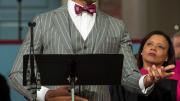Special Song—and Singer
Absent the regular Faust-era artist/entertainer honorand, there was still a pop-up performance. As Lonnie B. Bunch III was about to receive his degree, singer Davóne Tines ’09—in a smashing chalk-stripe suit and Harvard bow tie—emerged from the wings to deliver “Lift Every Voice and Sing” (often considered the “Black National Anthem”) in tribute. The title and a line from the lyric (“Stony the road we trod”) both figured in Bunch’s citation (page 16).
Better to Receive?
Before the work of conferring thousands of degrees, President Lawrence S. Bacow received one, on May 20, from Yale—continuing a kindly Harvard-Yale (and Princeton) custom. Hailing him as the “vanguard of veritas,” as a champion of higher education, the citation said “you have acquired a shem tov—a good name—by acting with wisdom and integrity.” (Bacow has used the term, one he no doubt cherishes, in some of his speeches.) Lest the lovefest go too far, Yale’s program notes wished “adventure, joy, and fulfillment—on all days except the Saturday before Thanksgiving.”
Technoprogress
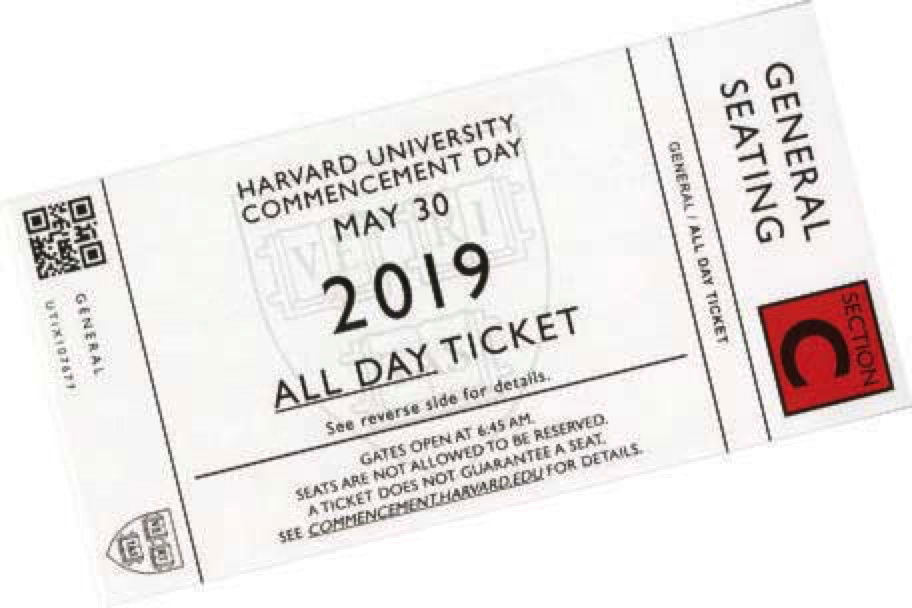
Last year, Commencement tickets got a scannable QR code. For 2019, the separate morning and afternoon tickets morphed into a single “all-day” version. Given the adoption of online balloting for Overseers and Alumni Association directors (see page 71), progress toward e-ticketing for Harvard’s Big Day seems inevitable, if gradual. Maybe by the 400th?
Tandem Honorands
After president emerita Drew Gilpin Faust received an honorary degree Thursday morning, her close collaborator Tamara Elliott Rogers ’74, former vice president of alumni affairs and development, became a Harvard Medalist during the afternoon ceremonies. The two worked together at Fay House, when Faust was Radcliffe Institute dean, and then in Mass Hall. And at the Phi Beta Kappa Literary Exercises on Tuesday, the poet was Dan Chiasson, Ph.D. ’01, poetry critic for The New Yorker. His boss, editor and author David Remnick, received an honorary doctorate (LL.D.) on Thursday.
The Fay Prize
The Radcliffe Institute bestowed the Captain Jonathan Fay Prize for outstanding undergraduate theses on three precocious seniors, drawn from the 72 Hoopes honorands recognized for outstanding scholarship: Mark Czeisler (son of Charles ’74, Baldino professor of sleep medicine), for neurobiological research on mammals’ circadian rhythms; Manuel Medrano, an applied mathematician, for work on deciphering khipus, the knotted Incan recordkeeping devices; and Anwar Omeish, a social-studies concentrator, who analyzed the political philosophy of Frantz Fanon.
Madame Caller
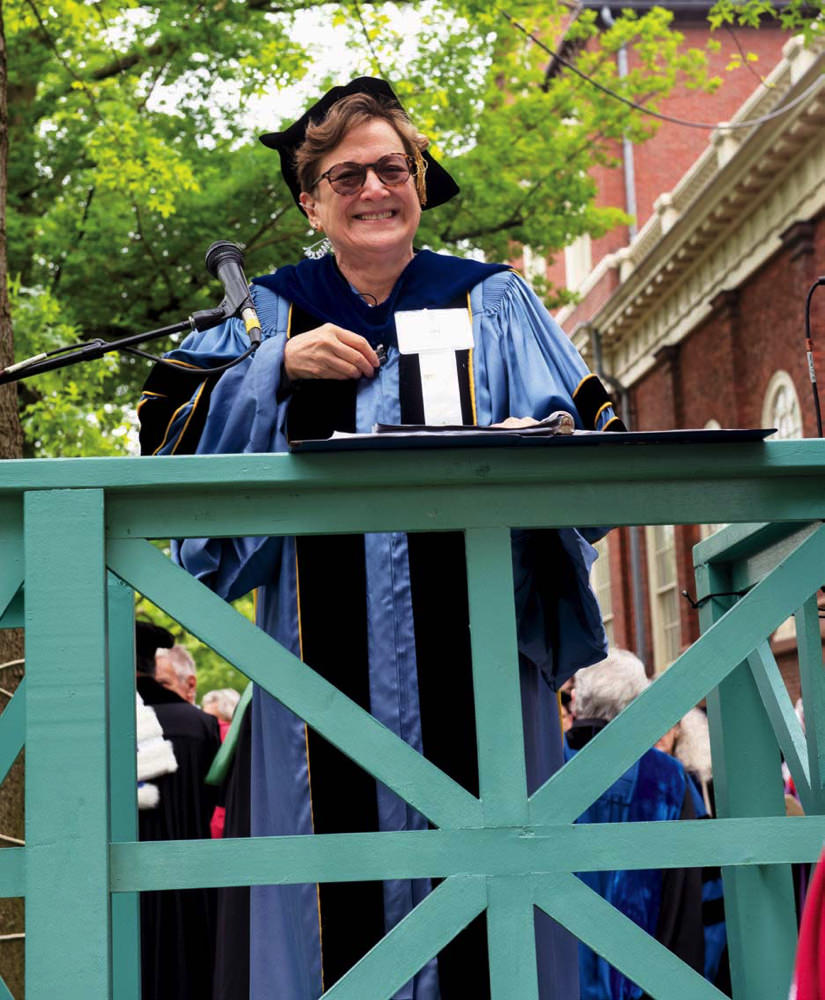
Kay K. Shelemay
Photograph by Jim Harrison
During a Commencement that featured many women leaders, Harvard made its own gesture toward gender equity. Watts professor of music and professor of African and African American studies Kay K. Shelemay served as Commencement Caller, the first woman in the thankless role of mustering unruly students, faculty members, alumni, administrators, and honorands for orderly procession from the Old Yard into Tercentenary Theatre. However she prepared, it worked: the Morning Exercises went off with clockwork precision.
Get Your Program!
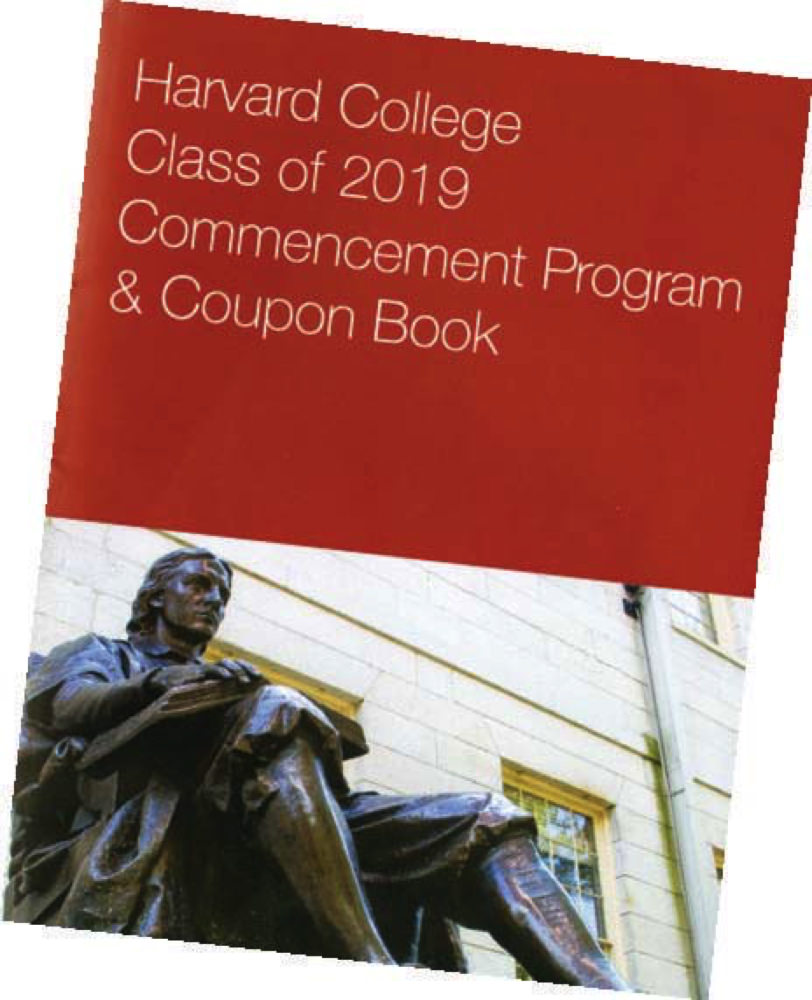
In a largely humor-free Commencement week, The Harvard Lampoon engineered one hack, handing out a “Program & Coupon Book” Thursday morning as ticket-holders lined up to enter the Yard. Contents, among the ads, included a send-up of the Crimson’s senior survey; alternate lyrics for “Fair Harvard”; and a schedule of the day’s events (from “Graduation carolers will wake up graduating seniors with jolly tunes about the value of education,” at 5:00 a.m., to a description of Morning Exercises as “a 3 mile swim and a 2 mile jog,” and on from there).
Keeping ’em Caffeinated
Having sold a reported 2,000 cups of coffee to not-yet-awake Commencement-goers last year from a serving station near Boylston Hall, the budding entrepreneurs from Harvard Student Agencies doubled down this year, with a second location at the Meyer Gate/Science Center entrance to the Morning Exercises. Still, no cupholders on the folding chairs in Tercentenary Theatre.
Where They’re Headed
The Harvard Crimson’s annual senior survey—distributed to 1,542 members of the class of 2019, of whom 717 responded—yielded results, especially about employment, closely matching the past several years’ surveys. Of respondents heading off to work, nearly half will report to duty in three industries—consulting (18 percent), finance (16 percent), and technology (14 percent)—the newspaper reported. Sixteen percent of respondents among those newly admitted to “the fellowship of educated individuals” are gluttons for punishment: they are entering graduate or professional school directly. And the class as a whole is a strongly coastal cohort, heading in much greater numbers to New York (23 percent), Massachusetts (21 percent), and California (14 percent) than to the heartland, where Harvard has been trying to develop and promote its ties.
Reunions Beyond the Routine
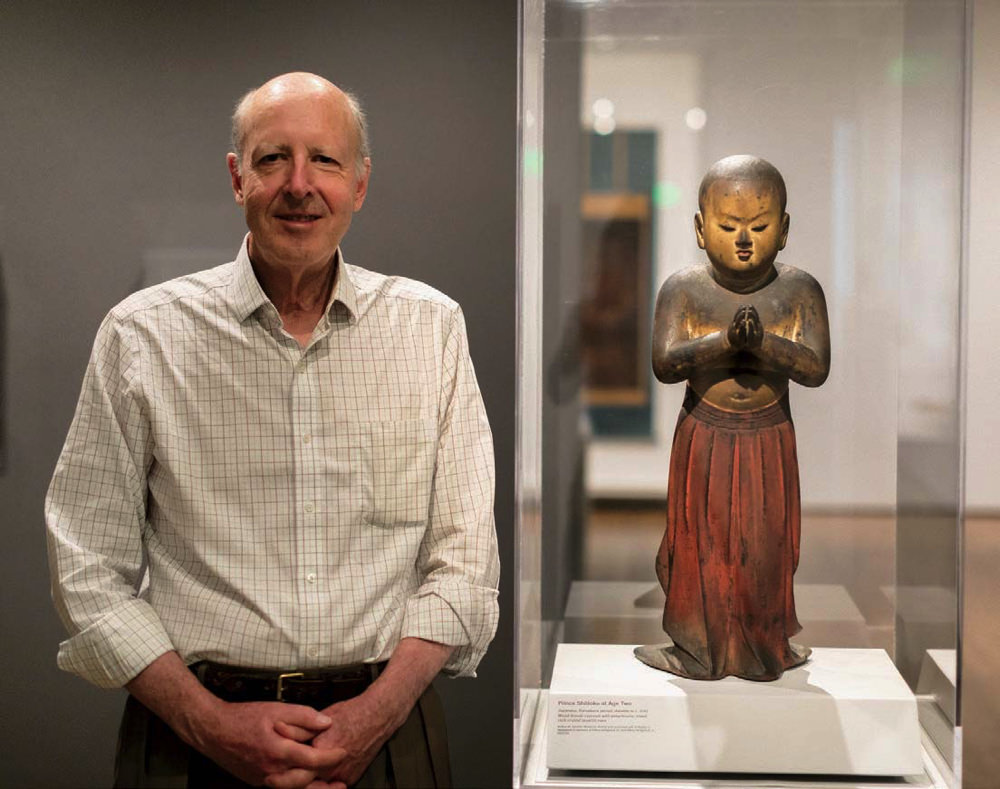
Photograph by Susan Young Photography
Reunions typically feature face time with old friends and familiar faculty members; drinks; and panels on new ways in which the world has gone to hell in a handbasket. But occasionally they can turn into something akin to the learning experiences of one’s youth. On May 25, the Harvard Art Museums debuted “Prince Shōtoku: The Secrets Within,” an exhibition focused on the diminutive sculpture of the prince, depicted at age two, at a miraculous moment: the purported arrival of Buddhism in Japan. The associated scholarship details the remarkable contents secreted within the statue, intact and dated to 1292, acquired as part of a promised 2006 gift from Walter C. Sedgwick ’69 (his grandfather Ellery Sedgwick, A.B. 1894, owner-editor of The Atlantic Monthly, purchased it in 1936). Visiting the gallery in lieu of reunion events, Walter Sedgwick said his highest aspirations for seeing the work used in a teaching-museum context had been more than fulfilled.
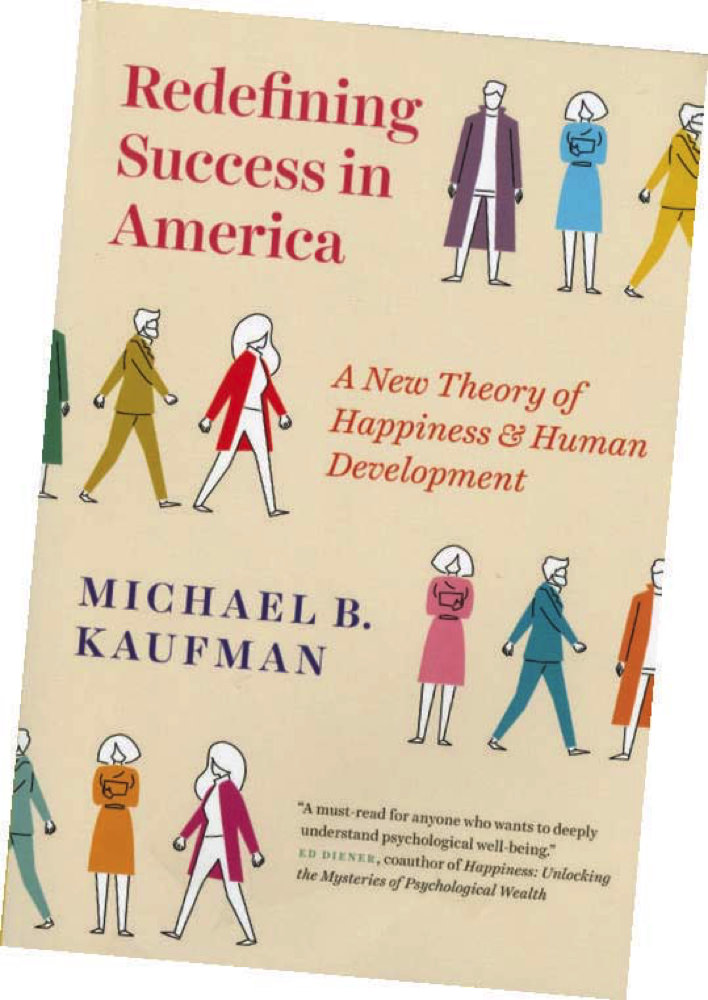
Separately, the fifty-fifth reunion dinner on Tuesday evening heard a presentation on a new book, Redefining Success in America (University of Chicago), by Michael B. Kaufman, M.B.A. ’94, now a psychologist. He exhumed records from the legendary Harvard Student Study, based on members of the classes of 1960 and 1961—including Stanley King’s in-depth interviews with 49 young men—and, during the past 15 years, followed up with many of them. His resulting theory of happiness and human development looks beyond the pursuit of status and wealth to the factors that determine a fulfilling life: mutually beneficial relationships; awareness and pursuit of one’s own goals; and capacity to deal with serious setbacks. The class members’ lived experience perhaps suggested as much, but Kaufman’s talk was the first formal outreach by researchers to share the findings with the subjects who made it possible.
Taurum Rubrum: Product Placement
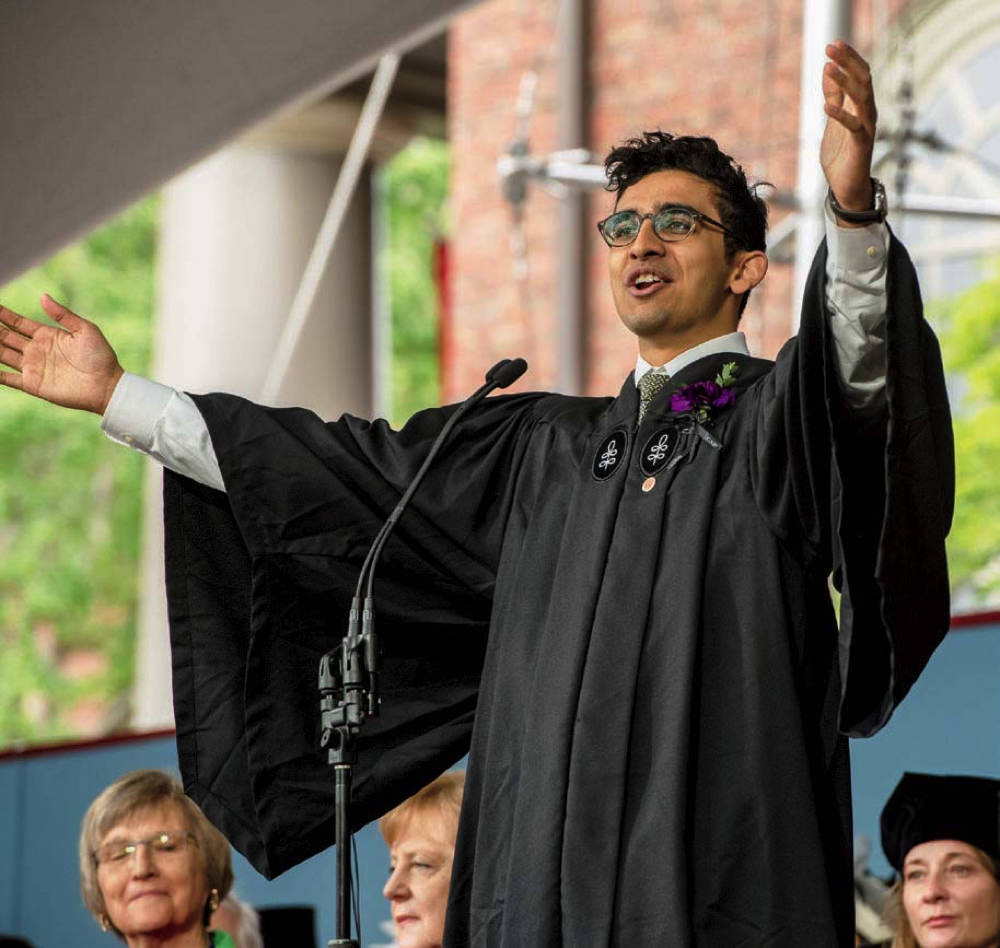
Kabir Gandhi
Photograph by Jim Harrison
As Latin Salutatorian Kabir Gandhi ’19 so aptly put it in his morning address, “Bibliothecae autem—et nimirum officinae alchimicae—constantes stant. Primo, eas in arces mutavimus, in quibus noctu solitudine lucubravimus (et multum ‘Taurum Rubrum’ bibebamus).” For those who lack his facility in Latin, Mandarin, and English: “Our libraries, however, and indeed our laboratories, stand unshaken. At first, these spaces were our fortresses, in which we worked through the night to finish our tasks in solitude (and while we were at it drank plenty of Red Bull).”
Feline Fail
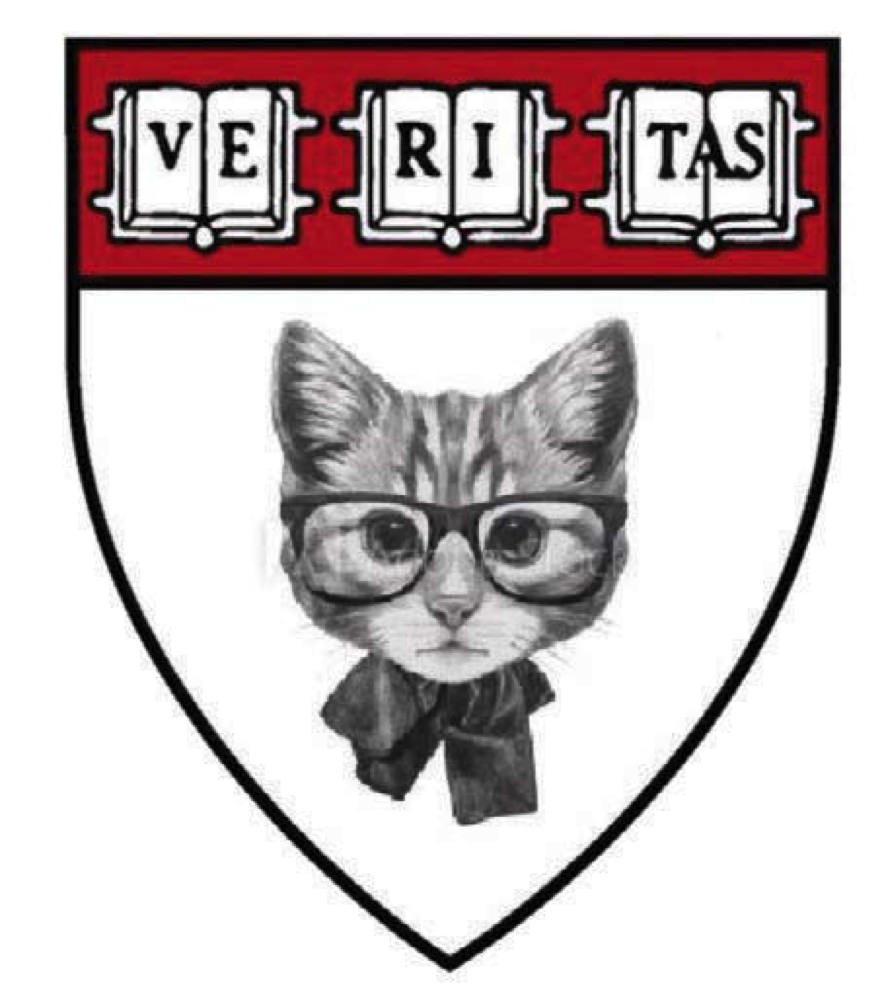
Despite the obvious diversity implications (no nonhumans were represented) and the strength of the case (the nominee “hangs out at Langdell Hall…inspiring and comforting students”), a Law School petition that Remy the cat be granted an honorary degree was unaccountably ignored. As this issue went to press, a dignified Remy declined to comment.
